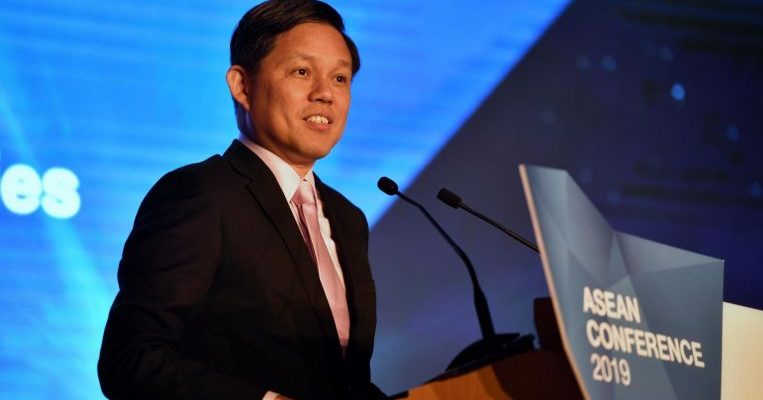
It will take time to see progress in trade issues between the United States and China, and Asean can take steps to prepare for a potentially lengthy period of uncertainty by striking new partnerships, Trade and Industry Minister Chan Chun Sing said yesterday.
It must continue to remain open and forge links with as many countries and economic blocs as possible, diversifying its markets and reducing its risks in the process, he said at the Asean Conference yesterday.
It is also in the interest of Asean and the world to uphold and update the World Trade Organisation system so there are open, transparent and inclusive rules for all countries to work together, Mr Chan added.
“The more we are able to leverage each other’s comparative advantage, the more we are able to boost global production for the good of our people,” he said in a dialogue with Singapore Business Federation (SBF) chief executive Ho Meng Kit.
Asean needs to also come together to seize new opportunities offered by the digital space, with the cross-border flow of data allowing firms to create new products and services. It should work on common platforms in payment systems and intellectual property protection as well, he said.
But Mr Chan cautioned: “If we trip over ourselves with fragmented rules and regulations, not only will we not have an integrated Asean market, we subtract from our efforts to boost the Asean brand.”
He cited companies such as Grab and Gojek, which used digital platforms to integrate markets across Asean. So, notwithstanding the US-China dispute and issues like Brexit, there were opportunities for Asean businesses to thrive, he said.
On the US-China dispute, Mr Chan said: “There is a lack of strategic trust between the two, and that will take time to resolve.”
Both faced long-term challenges.
For the US, this means upholding its long-term competitiveness, defined by factors such as enterprise, innovation and people’s skills.
For China, this involves mitigating the unequal pace of development among its cities and balancing resource allocation without risking a loss of political control.
Mr Chan also said shifts in global supply chains and distribution networks will be inevitable, but the greater danger lies in the potential falls in the volume of trade flows.
“If that comes down, it is not so easy to revive the confidence in the global markets, including financial markets,” he added.
In a keynote speech at the event at The Ritz-Carlton, Millenia Singapore, he spelt out three things firms can do to prevent the global geopolitical and economic situation from deteriorating further as well.
First, they can make a case to keep markets open and integrated, such as by helping to eliminate non-tariff barriers and making a strong call for the early conclusion of the Regional Comprehensive Economic Partnership this year.
Second, they can give fresh ideas on emerging issues like digital integration. Third, businesses can help workers pick up new skills to remain relevant in a time of disruption.
United Overseas Bank deputy chairman and chief executive Wee Ee Cheong said at the event that new technologies allow industries to be more efficient, and this will boost Asean’s position as a global manufacturing hub.
To help firms grow regionally, SBF chairman Teo Siong Seng said, the group is launching market-focus business networks, starting with Vietnam, Indonesia, Thailand and Myanmar, in the next 12 to 18 months.
